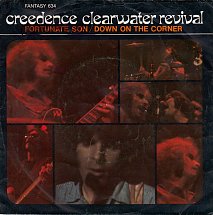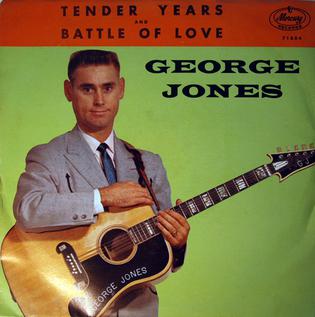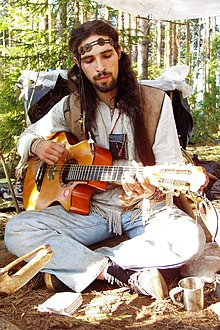
Jean-Philippe Léo Smet, better known by his stage name Johnny Hallyday, was a French rock and roll and pop singer and actor, credited with having brought rock and roll to France.

Sylvie Vartan is a Bulgarian-French singer and actress. She is known as one of the most productive and tough-sounding yé-yé artists. Her performances often featured elaborate show-dance choreography, and she made many appearances on French and Italian TV.

"Fortunate Son" is a song by the American rock band Creedence Clearwater Revival, released on the band's fourth studio album, Willy and the Poor Boys in October 1969. It was previously released as a single, together with "Down on the Corner", in September 1969. It soon became a Vietnam anti-war movement anthem and an expressive symbol of the counterculture's opposition to U.S. military involvement in the Vietnam War and solidarity with the soldiers fighting it. The song has been featured extensively in pop culture depictions of the Vietnam War and the anti-war movement.

David Hallyday is a French singer, songwriter, actor and amateur sports car racer.
Maritie and GilbertCarpentier, a married couple, were artistic producers of very popular variety TV and radio shows in France and in many French-speaking countries, from the 1950s to the 1990s.

"Da Doo Ron Ron (When He Walked Me Home)" is a song written by Jeff Barry, Ellie Greenwich and Phil Spector. It first became a popular top five hit single for the American girl group the Crystals in 1963. American teen idol Shaun Cassidy recorded the song in 1977 and his version hit number one on the Billboard Hot 100 chart. There have also been many other cover versions of this song, including one by the songwriters Jeff Barry and Ellie Greenwich themselves, performing as the Raindrops.
This page presents the discography of French singer Sylvie Vartan.

Sang pour sang is a 1999 album recorded by French singer Johnny Hallyday. It was released on 13 September 1999, and achieved huge success in France and Belgium (Wallonia), where it topped the charts and stayed on the charts for respectively two and one years. It provided five top 15 singles in France : "Vivre pour le meilleur", "Un jour viendra", "Sang pour sang", "Partie de cartes" and "Pardon". David Hallyday, Johnny's son, participated in the composition of all the songs of the album, along with Miossec and Zazie.

"Ya Ya" is a song by Lee Dorsey. The song was written by Dorsey, C. L. Blast, Bobby Robinson, and Morris Levy. Levy's participation in the writing has been called into question; the Flashback release of the single lists only Dorsey and Blast as writers, as do the liner notes to the American Graffiti soundtrack.

"Tender Years" is a song written by American country music artist George Jones and Darrell Edwards, recorded and released in 1961. It became Jones' second #1 country hit. The song also spawned two successful foreign language versions two years later in 1963, First in French by Johnny Hallyday, and in Dutch by singer and actress Willeke Alberti, being adapted from the former French version. Both versions have been covered by many others since.

"J'ai un problème" is a French language song, a duet by then-married couple Sylvie Vartan and Johnny Hallyday. However, the single cover credited a shortened version of their name as Sylvie & Johnny.
Salut les copains is a series of albums released through Universal Music France to commemorate the best of music featured in French scene as sponsored by the "Salut les copains" radio program in France and the French Salut les copains magazine. The tracks include French original singles, French-language covers of known hits as well as European and American hits popular in France. The track list is a representative wide selection of the "Yé-yé" generation of French music.
Marie-Louise Pleiss, stage name Ria Bartok, was a French singer of yéyé pop songs.

D'où viens-tu Johnny ? is a 1963 French film directed by Noël Howard, starring French rock and pop idols Johnny Hallyday and Sylvie Vartan, both of whom would later marry two years later.

"Essayez" ("Try") is a song by French singer Johnny Hallyday. It was released on his 1970 studio album Vie as the album's third and final single in December 1970.

"Ma guitare" is a song by French singer Johnny Hallyday from the 1963 film D'où viens-tu Johnny? It was also released on a double A-side single.

"Que je t'aime" is a song by French singer Johnny Hallyday. It was released on 23 June 1969 in France and on 11 September 1969 in Italy. The music has been composed in one night by the French artist Jean Renard, the lyrics have been written by Gilles Thibaut. Johnny Hallyday was looking for a strong song for his new show at Le palais des Sports. The song is a success, loved or at least known by most of the French population. The hardcore fans of Hallyday, the rock and roll' fans but also people from a more pop music atmosphere.

"Oh! Ma jolie Sarah" is a song by French singer Johnny Hallyday. It was released in April 1971 as the lead single of Hallyday's 1971 studio album Flagrant délit. Written by Philippe Labro, Tommy Brown and Mick Jones, "Oh! Ma jolie Sarah" is one of the great successes of Hallyday, who regularly included the song his tours.
Edmond Vartan was a French musician, bandleader, arranger, and record producer of Armenian descent.

"Quelque chose de Tennessee" is a 1985 song recorded by French singer Johnny Hallyday. Written and produced by Michel Berger, it was released in December 1985 as the third single from the album Rock'n'Roll Attitude, on which it appears as the third track. It is a tribute to American playwright and screenwriter Tennessee Williams, who created A Streetcar Named Desire (1947), Cat on a Hot Tin Roof (1955), Sweet Bird of Youth (1959), and The Night of the Iguana (1961), among others. The song was a top ten hit in France and became one of Hallyday's most popular songs throughout years.
















